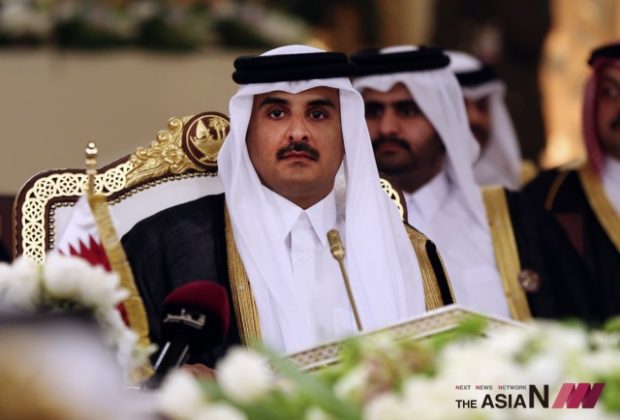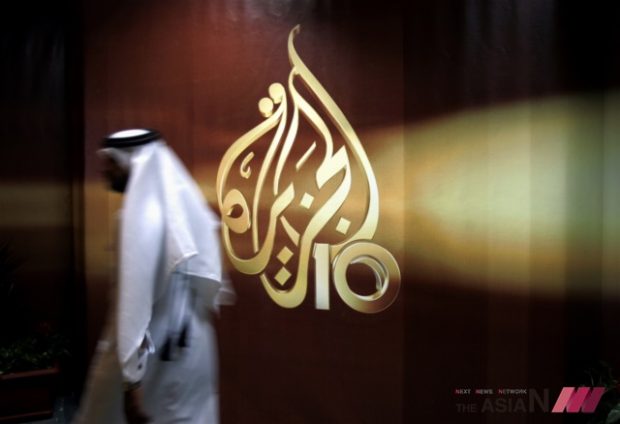Qatar Crisis: How Media Can Start Wars and End a State

In this Tuesday, Dec. 9, 2014 file photo, Qatar’s Emir Sheikh Tamim bin Hamad Al-Thani attends a Gulf Cooperation Council summit in Doha, Qatar. Bahrain says it is cutting diplomatic ties to Qatar amid a deepening rift between Gulf Arab nations. (Photo : AP / NEWSis)
It was unexpected, but it happened. A member of the Cooperation Council for the Arab States of the Gulf is being harshly punished by neighbors and members in the same Arab league. According to the Arabic calendar, the tenth day of Ramadhan reminds Arabs of their victory over Israel’s occupant troops in Sinai (Egypt) and Golan (Syria) fifty years ago. To the rest of the world, it is June 5th is a reminder of Arab nations’ defeat to their historical enemy, Israel. It seems that the history the 5th of June—10th Ramadhan day—should be rewritten. The 5th of June is when the Kingdom of Saudi Arabia, Bahrain, United Arab Emirates, and the Arab Republic of Egypt decided to cut political ties with the State of Qatar.
That was the beginning as the four countries joined forces (along with other Arab and Asian countries) to launch an economic attack against the tiny peninsula that consisted of almost 2.3 million people (mostly foreigners) who depended heavily on imported food and products.
Qatar was blocked from flying through their airspace and to the airports of any of the four main Arab nations. The country was also blocked from its only land access by Saudi Arabia. The official reason for the blockade was that Qatar was allied with terrorism.
As it is difficult to explain, it is crucial to observe the political situation of the region of the past six years, as it was clear that Qatar media and financial sector were behind the instability of the Arab Spring countries. Egyptian officials had known of this for years, but Cairo did not take any particular action, one of the reasons being many Egyptian laborers were working in Doha (numbers reaching the 400 thousands). Another reason was Arab Gulf States’ support of one of the Cooperation Council members. So, what is new?
After the political upheavals of the Arab Spring, Qatar aligned itself with Islamist political parties such as Egypt’s Muslim Brotherhood, and other radical Islamists when backing Islamist fighters in rebellions that took place in Syria and Libya. Here comes the moment of truth when the Gulf States considered those political Islamists groups were working against the political systems inside the Gulf itself. To their surprise, it was revealed that Qatar paid a huge amount of money, besides sending critical information to military in Yemen that caused the fatalities of many of UAE fighters and Saudi soldiers in Yemen. Qatar’s actions also supported the Houthi rebels, a startling claim given that Qatar, only a day before, was part of the Saudi-led coalition fighting the Houthis, a group loosely backed by Iran.
Qatari officials apparently paid close to $1 billion in ransom for the release of a Qatari falconry party abducted while hunting in southern Iraq. The bulk of the funds allegedly made their way to Iranian officials and affiliated Shiite militias — payments that were “the straw that broke the camel’s back” for Qatar’s critics in the Gulf, according to a source quoted by the Financial Times.
Sheikh Sabah al-Ahmed Al-Sabah, Emir of Kuwait, who has been tasked with kick-starting the rapprochement between Doha and its Gulf neighbors, met the Emirati Vice President and the Crown Prince of Abu Dhabi after a short visit to Saudi Arabia. This, though, before his talks with Qatari Emir, Sheikh Tamim bin Hamad al-Thani.
Saudis have reportedly given Qatar a 24-hour ultimatum to fulfil a number of conditions they set in response to efforts to mediate relations between the two Arab states:
1. Immediate severance of diplomatic relations with Iran
2. Expulsion of all members of the Palestinian resistance movement Hamas from Qatar
3. Freezing all bank accounts of Hamas members and refraining from any deal with them
4. Expulsion of all Muslim Brotherhood members from Qatar
5. Expulsion of anti-[P]GCC elements
6. Ending support for ‘terrorist organizations’
7. Stopping interference in Egyptian affairs
8. Ceasing the broadcast of the Al Jazeera news channel
9. Apologizing to all [Persian] Gulf governments for ‘abuses’ made by Al Jazeera
10. Pledging that it [Qatar] will not carry out any actions that contradict the policies of the [P]GCC; adhering to its charter
As of now, it seems unlikely that Qatar would follow any of the conditions numerated above. Meanwhile, a recent agreement between the four main countries embroiled in this crisis: Egypt, Saudi Arabia, Emirates and Bahrain, enlisted 59 persons and 12 authorities of Qatar as terrorists or having supported terrorism in any manner.
The clearest condition—for me—is for a call to end the broadcast of the Al Jazeera news channel, as this gave Qatar control over the political scene for years. Ending Al Jazeera will be a swift way to ending the State of fake news.

In this Nov. 1, 2006 file photo, a Qatari employee of Al Jazeera Arabic language TV news channel walks past the logo of Al Jazeera in Doha, Qatar. Hackers allegedly broke into the website of Qatar’s state-run news agency and published a fake story quoting the ruling emir, authorities there said Wednesday, May 24, 2017, as Saudi Arabia and the United Arab Emirates responded by blocking Qatari media, including broadcaster Al-Jazeera. (Photo : AP / NEWSis)

























































